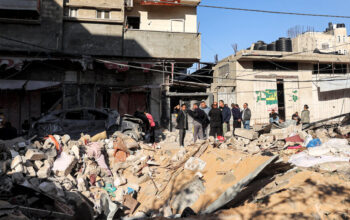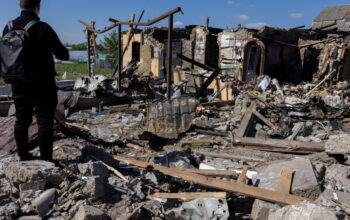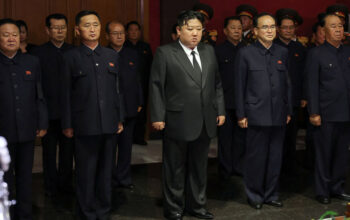
Going into the winter, military analysts expected that the fighting in Ukraine would slow down as wet and snowy terrain made it too difficult for either Russia or Ukraine to make major offensive pushes. Sure enough, the territorial lines have remained largely the same since a successful Ukrainian offensive in the late summer and fall.
Still, some recent battles have been good for Vladimir Putin, Russia’s president. But other developments, especially continued Western unity in support of Ukraine, have gone badly for Russia. (Still others are just horrible, no matter how they affect the war outcome, including a Russian strike on civilians in the city of Dnipro over the weekend that killed at least 35 people.) How these developments unfold could help to decide the next phase of the war.
Today’s newsletter will look at Putin’s recent wins and losses and what they mean for Ukraine.
Putin’s wins
Russia has recorded few battlefield wins since the late summer. Instead, the losses have piled up as Ukraine retook territory in the east and south.
But Russian forces recently made gains around the city of Bakhmut in eastern Ukraine and seemingly took Soledar, a town on the outskirts of the city. (Ukraine claims it’s still fighting.)
A victory in Soledar would be more symbolic than strategic, military analysts say. Russia has been deprived of wins in recent months, so any kind of success could help maintain support for Putin’s war. But Soledar itself likely will not play a major role in retaking Bakhmut or the greater region of Donbas, which has been one of Putin’s primary targets.
Another success for Putin in recent months is the lack of battlefield losses. Russian defenses appear to have held in the east and south. Again, analysts expected that battlefield lines would not move much during the winter. But that was not always guaranteed; Ukraine, for one, promised to continue its offensive push even in the winter months. That hasn’t happened, allowing Russia to hold territory.
“By maintaining its defensive strategy, Russia has prevented a cascading, catastrophic collapse — which would be the best hope for a dramatic Ukrainian victory,” said my colleague Julian Barnes, who covers national security for The Times.
Putin’s losses
As the winter began, supporters of Ukraine worried that Western unity could begin to break. Europeans in particular faced the prospect of a cold winter and skyrocketing energy prices, fueled by sanctions against the Russian oil and gas that provided power for much of the continent.
But with proper preparation and some luck, the worst has not come to pass. European nations stocked up on gas from alternative sources, like the U.S., Nigeria and Qatar. And the winter proved to be relatively warm, allowing Europeans to avoid some of the higher fuel prices, as my colleague Somini Sengupta wrote.
Subsequently, Western unity around Ukraine has held. If anything, it has strengthened. Western powers are promising Ukraine tanks and other armored vehicles, discarding fears that providing these weapons would be seen as too provocative by Russia. “The debate is not about whether to do less but how to do more for Ukraine,” Julian said.
Another bad sign for Putin: He has again changed Russian military leadership in Ukraine. Russia recently replaced Gen. Sergei Surovikin, who also headed Russia’s brutal campaign in Syria, with a close ally of the Kremlin, Gen. Valery Gerasimov. It was the second leadership change in three months, signaling that Putin is unhappy with how the war is going.
Looking forward
Recent events mostly amount to a mixed picture for both Russia and Ukraine.
While Ukraine has performed much better than many analysts expected at the onset of the war, it still must make major battlefield gains in the east and south to have any hope of a favorable peace deal. Continued Western unity — and tanks — could help achieve those victories.
But Russia’s recent battlefield wins and leadership changes could also help its military overcome previous Ukrainian momentum. Ukrainian officials warned recently that Russia was preparing for a new offensive, one that could push into their capital, Kyiv, once again. American officials are less sure that Russia has the ability to mount a major new push.
Regardless of which side pushes first, the coming battles, as wet and snowy conditions recede, will decide who has the advantage.
For more
THE LATEST NEWS
Politics
-
A year after promising a voting rights overhaul, President Biden offered no concrete policy plans in a speech to Atlanta’s Black community on Martin Luther King’s Birthday.
-
Election deniers in Pennsylvania persuaded county officials to conduct a 2020 recount last week — and didn’t believe the result when it showed almost no change.
-
Eric Adams, New York’s mayor, visited the southern border to pressure Biden to send the city financial help to respond to an influx of migrants.
International
-
Global inequality and food crises are challenging the relevance of the World Economic Forum, happening this week in Davos, Switzerland.
-
A flight in Nepal was caught on video moments before a crash yesterday that killed at least 68 people.
-
The attack on Brazil’s capital shows how extremism is a grave threat to Latin America’s biggest democracy.
-
The Italian police arrested the mafia boss Matteo Messina Denaro, one of the country’s most wanted fugitives.
-
After a yearslong standoff, the police cleared climate activists trying to prevent the razing of a German village to make way for an open-pit coal mine.
Universities
Other Big Stories
Opinions
The Rev. Dr. Martin Luther King Jr.’s last sermon shows a focus on the economics of racism that politicians often ignore, Esau McCaulley says.
SPORTS NEWS FROM THE ATHLETIC
Cincinnati’s survival: Joe Burrow and the Bengals advanced to the A.F.C. Divisional Round after a close win against the Ravens. Next up: Buffalo.
An exclusive club: LeBron James surpassed 38,000 career points, joining Kareem Abdul-Jabbar as the only players in N.B.A. history to reach the point total.
A trade: The Connecticut Sun sent Jonquel Jones, a previous women’s basketball M.V.P., to the New York Liberty yesterday as part of a three-team trade.
ARTS AND IDEAS
A rocking party, decades on
On Friday nights, a crowd gathers at a nightclub in Ann Arbor, Mich., to drink, flirt and dance to live rock music. The party’s official name is “Ann Arbor Happy Hour at Live,” but it’s also affectionately known as the “Geezer Dance Party.”
That’s because almost the entire crowd is over 65. “I call us the silver tsunami,” said Randy Tessier, a 72-year-old University of Michigan lecturer who organizes the event. “There’s a lot of us, and we still want to rock.”
The gathering is the latest version of a musical happy hour that has been happening since the 1970s, and some regulars have been coming for over 50 years. “It is the most wonderful thing in my life,” Maggie Levenstein said. “It makes me happy every single week.”



